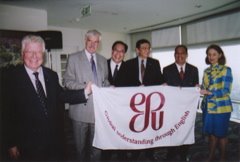The 2006 IPSC
The 2006 ESU International Public Speaking Competition will be held in London from May 16 to 19, 2006, on the topic of “Mapping the Global Future.”
More details about the IPSC can be had from this PDF file.
Following our practice over the past several years, ESU Philippines is cooperating with the Inquirer Intercollegiate Debate Championships (IIDC), an annual gathering of the country's best young debaters and public speakers, in selecting the Philippine representative to the IPSC. Last year's representatives were Kevin Punzalan of DLSU and Julie Prescott of UP Visayas. In 2004, Patricia Evangelista of UP Diliman won the IPSC championship.
This year, the IPSC selection round will be held on April 6, 12:30 pm at the University of the Philippines School of Economics, in conjunction with the IIDC. Anyone interested is advised to inquire with Nicolo Cabrera of the IIDC at nicolo.cabrera@gmail.com.
More details about the IPSC can be had from this PDF file.
Following our practice over the past several years, ESU Philippines is cooperating with the Inquirer Intercollegiate Debate Championships (IIDC), an annual gathering of the country's best young debaters and public speakers, in selecting the Philippine representative to the IPSC. Last year's representatives were Kevin Punzalan of DLSU and Julie Prescott of UP Visayas. In 2004, Patricia Evangelista of UP Diliman won the IPSC championship.
This year, the IPSC selection round will be held on April 6, 12:30 pm at the University of the Philippines School of Economics, in conjunction with the IIDC. Anyone interested is advised to inquire with Nicolo Cabrera of the IIDC at nicolo.cabrera@gmail.com.


